We may not have the course you’re looking for. If you enquire or give us a call on +44 1344 203999 and speak to our training experts, we may still be able to help with your training requirements.
We ensure quality, budget-alignment, and timely delivery by our expert instructors.
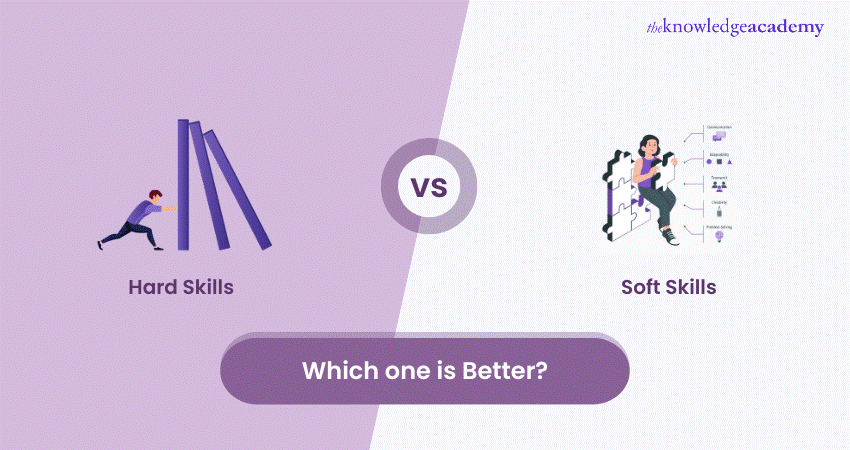
When it comes to career success, is it Hard Skills vs Soft Skills that matter most? The truth is both play a crucial role. Hard skills showcase your technical expertise, while soft skills define how you communicate, collaborate, and adapt. Employers seek a balance of both, making it essential to understand their differences and how to leverage them effectively.
In today’s job market, 93% of employers value Soft Skills as much as Hard Skills. So, which one truly matters? In this blog, we’ll explore the importance of hard and soft skills, how they complement each other, and how you can use them to land your ideal job or advance in your career.
Table of Contents
1) Hard Skills vs Soft Skills: Key Differences
2) How To Develop Hard Skills and Soft Skills?
3) How To Include Soft Skills and Hard Skills on a CV?
4) What Skills Are Employers Looking For?
5) Conclusion
Hard Skills vs Soft skills: Key Differences
Success in any profession requires a combination of both Hard and Soft Skills. Hard Skills are job-specific technical abilities acquired through education and training, while Soft Skills relate to interpersonal attributes and how one interacts in a workplace. Understanding the key differences between the two helps in developing a well-rounded skill set for career growth, which is why becoming a Soft Skills Trainer can be a great way to share this knowledge and help others succeed.
How to Develop Hard Skills and Soft Skills?
Hard skills as well as Soft Skills development requires continuous learning, hands-on practice, self-awareness, and applications of real-life. Striking a balance between both enhances professional growth and career success. Here are some effective methods to develop these demanding skills:
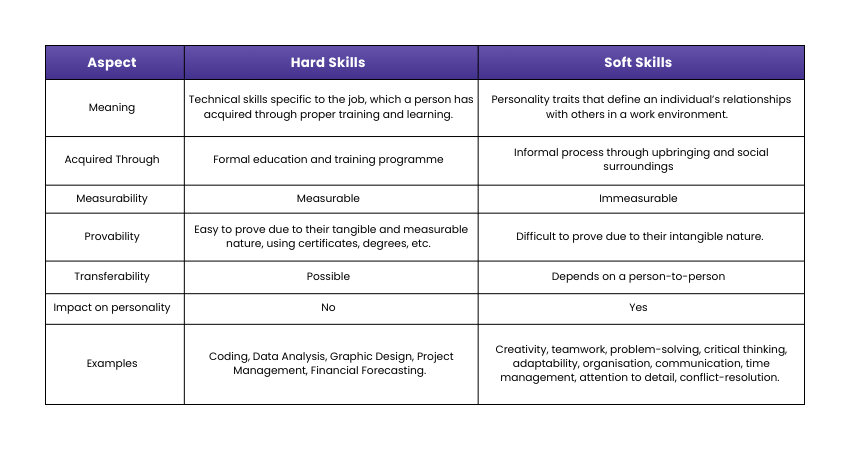
Hard Skills
Here is how you can develop Hard Skills:
a) Join Education Classes
Taking formal courses from universities, colleges, or online learning platforms provides structured knowledge and certifications that industrial experts recognise. These courses often cover theoretical concepts, practical applications, and best practices in each field, making them a solid skill development foundation.
b) Leverage Online Tutorials
Online learning resources offer accessible and flexible ways for Hard Skills enhancement. These platforms provide vast video lesson libraries, step-by-step pathways, and hands-on exercises to reinforce learning.
c) Attend Workshops & Training Sessions
A practical training programme, Boot Camps that are industrial-specific, and professional workshops offer experiences through hands-on learning. These sessions allow participants to perform expert interactions, work on real-world problems, and gain practical industry trends and insights into best practices.
d) Work on Personal Projects
Applying newly learned skills to personal projects is an effective way to practice, experiment, and refine abilities. Whether it’s building a website, analysing data sets, developing an app, or designing marketing materials, personal projects help bridge the gap between theory and practice.
e) Seek Mentorship & Coaching
Learning from experienced professionals, mentors, or knowledgeable teammates provides valuable insights, constructive feedback, and industry-specific guidance. Mentors can share their expertise, offer advice about careers, and help individuals effectively navigate challenges.
Soft Skills
Here are the ways to develop effective Soft Skills:
a) Seek Feedback from Others
Ask for constructive feedback from mentors, colleagues, or peers for their strength of understanding and improvement areas. Feedback regularly helps refine communication styles, leadership approaches, and teamwork abilities. Listening with an open mind and implementing suggestions can accelerate personal growth and professional development.
b) Practice Self-Reflection
Assessing your interactions regularly, decision-making processes and emotional responses helps build self-awareness. Identifying behaviour patterns allows for continuous improvement in Emotional Intelligence, conflict resolution, and adaptability.
c) Participate in Group Activities
Collaborative project engagement, workplace teams, or social clubs promote essential interpersonal skills. These include teamwork, problem-solving, and adaptability. Such vast experiences provide opportunities to interact with diverse individuals, learn conflict resolution techniques, and develop dynamic leadership qualities in corporate environments.
d) Attend Workshops or Seminars
Structured learning environments provide interactive training, expert insights, and hands-on exercises tailored for Soft Skills development. Among these, workshops focused on public speaking, leadership, or emotional intelligence to offer practical strategies for communication enhancement and effectiveness in the workplace.
e) Engage in Role-Playing Exercises
Simulating workplace or social scenarios, such as handling difficult conversations, negotiating deals, or leading a team, helps develop confidence and adaptability. Practising these skills in a controlled setting prepares individuals to respond effectively to challenges in professional and personal interactions.
Leverage your listening skills for career growth- Sign up for our Active Listening Training!
How to Include Soft Skills and Hard Skills on a CV?
Incorporating both hard and soft skills into your CV is critical to setting yourself apart from the competition. Furthermore, this approach provides an easy way for employers to be noticed, which can be advantageous when dealing with Application Tracking Systems (ATS).
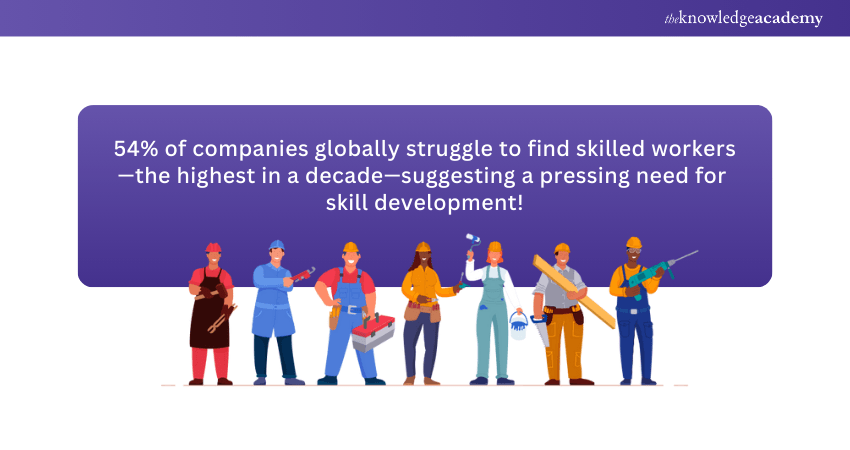
Hard Skills
The following are the effective ways to include Hard Skills in your CV:
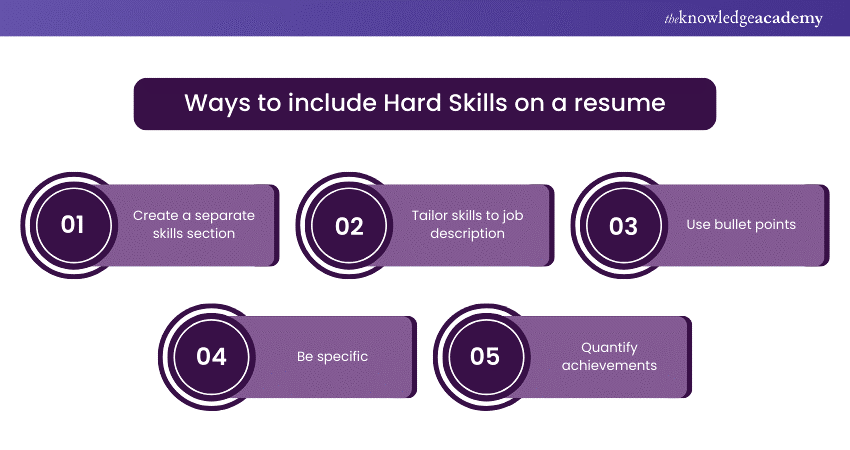
a) Create A Skills Section Separately: Dedicate a distinct section for Hard Skills relevant to your applied job. This makes it easier for Recruiters and Hiring Managers to scan and identify your core competencies at a glance.
b) Tailor Skills To Job Description: Customise your Hard Skillsets based on the specific job posting requirements. Review the job description carefully and include only the most relevant skills that match the employer’s needs.
c) Use Bullet Points: Present your Hard Skills in a concise, bulleted format for readability and accessibility enhancement. This format allows recruiters to quickly scan and identify key proficiencies without relying on lengthy descriptions.
d) Be Specific: Instead of listing generic skills, provide specific expertise-related examples. Highlight certifications, software proficiencies, or technical training that validate your Hard Skills. This adds credibility and reassures employers of your area’s competence.
e) Quantify Achievements: Whenever applicable, use metrics, numbers, or results to demonstrate how your Hard Skills have contributed to past success. For example, instead of stating "Data Analysis," highlight "Analysed large datasets, improving efficiency by 30%." Quantifying accomplishments makes your skills more impactful and measurable.
Master impactful communication with our Communication and Influencing Skill Training – Sign up today!
Soft Skills
The following are the ways to include Soft Skills in your CV:
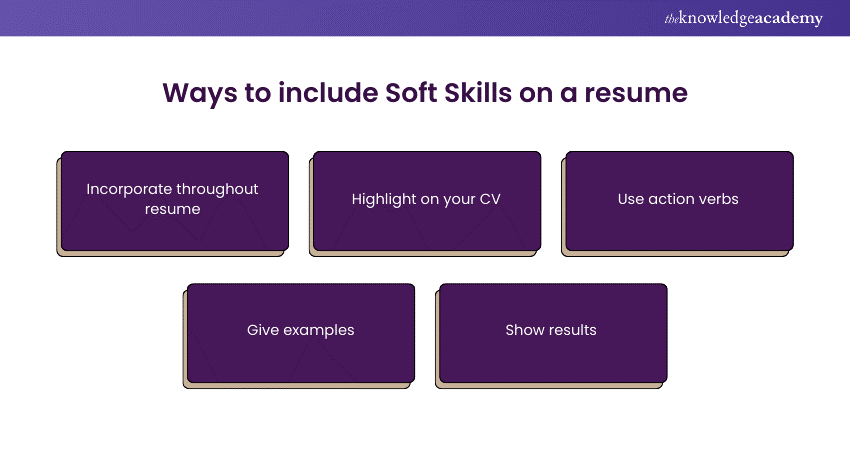
a) Incorporate Throughout CV: Instead of listing Soft Skills in a separate section, weave them into the summary, work experience, and key achievements. Demonstrate how you have applied skills like teamwork, adaptability, and problem-solving in real workplace scenarios to make them more impactful.
b) Highlight On Your CV: Showcase Soft Skills by illustrating how they have contributed to success in previous roles or projects. For instance, instead of simply stating "strong leadership," mention how you led a team to achieve a specific goal or improved workplace collaboration.
c) Use Action Verbs: Enhance your CV by using powerful action words that convey Soft Skills effectively. Words like "collaborated," "mentored," "negotiated," "facilitated," and "led" make your experience sound more dynamic and compelling.
d) Give Examples: Support your Soft Skills with anecdotal evidence or specific situations where you applied them successfully. For example, if you want to highlight problem-solving skills, mention a time when you identified and resolved a critical issue, leading to a measurable improvement in performance or efficiency.
e) Show Results: Demonstrate the value of your Soft Skills by sharing the outcomes of your efforts. If your communication skills improved team collaboration, mention how it increased productivity. If your customer service skills lead to positive feedback, highlight the impact on client retention or satisfaction.
Build your confidence with proven Soft Skills Interview Questions. Prepare like a pro now!
What Skills Are Employers Looking For?
Employers seek candidates who possess a blend of hard and Soft Skills, including effective communication, critical thinking, adaptability, creativity, and problem-solving abilities. These competencies enable individuals to navigate complex work environments, collaborate with diverse teams, and drive innovation within organisations.
By combining these abilities, employers can be confident that their candidates will meet the challenges of the ever-changing work environment.
Take the first step towards visionary leadership – Sign up for our Leadership Skills Training now!
Conclusion
Hard skills and Soft Skills are required to succeed in the working environment. It will be your Soft Skills Interview Questions that turn the table in regard to making you a valuable employee or a leader. Building technical competence and balancing it with interpersonal competencies is important. It prepares candidates for career success with today's competitive job requirements!
Transform challenges into opportunities effortlessly- Register for our Growth Mindset Training today!
Frequently Asked Questions
Why Are Hard Skills More Important Than Soft Skills?

Hard Skills are more important than Soft Skills as they demonstrate a candidate’s technical expertise and ability to perform specific job tasks effectively. Employers depend on Hard Skills to evaluate qualifications, ensure productivity, and satisfy industry requirements, while Soft Skills enhance workplace interactions.
What Is a Hard Skill on a Resume?

A hard skill on a CV is a specific, measurable ability that candidates acquire through education, training, or experience. Employers seek Hard Skills to evaluate a candidate’s qualifications and capability to perform job-related tasks efficiently.
What Are the Other Resources and Offers Provided by the Knowledge Academy?

The Knowledge Academy takes global learning to new heights, offering over 3,000 online courses across 490+ locations in 190+ countries. This expansive reach ensures accessibility and convenience for learners worldwide.
Alongside our diverse Online Course Catalogue, encompassing 19 major categories, we go the extra mile by providing a plethora of free educational Online Resources like News updates, Blogs, videos, webinars, and interview questions. Tailoring learning experiences further, professionals can maximise value with customisable Course Bundles of TKA.
What Is the Knowledge Pass, and How Does It Work?

The Knowledge Academy’s Knowledge Pass, a prepaid voucher, adds another layer of flexibility, allowing course bookings over a 12-month period. Join us on a journey where education knows no bounds.
What Are Related Courses and Blogs Provided by the Knowledge Academy?

The Knowledge Academy offers various Personal Development Courses, including Time Management Training, Communication and Influencing Skill Training and Active Listening Skills Course. These courses cater to different skill levels, providing comprehensive insights into Top 25 Technical Skills for Today’s Job Market.
Our Business Skills Blogs cover various topics related to corporate skills, offering valuable resources, best practices, and industry insights. Whether you are a beginner or looking to advance your Business Improvement skills, The Knowledge Academy's diverse courses and informative blogs have you covered.
Upcoming Business Skills Resources Batches & Dates
Date
 Time Management Training
Time Management Training
Fri 23rd May 2025
Fri 18th Jul 2025
Fri 12th Sep 2025
Fri 14th Nov 2025






 Top Rated Course
Top Rated Course



 If you wish to make any changes to your course, please
If you wish to make any changes to your course, please


